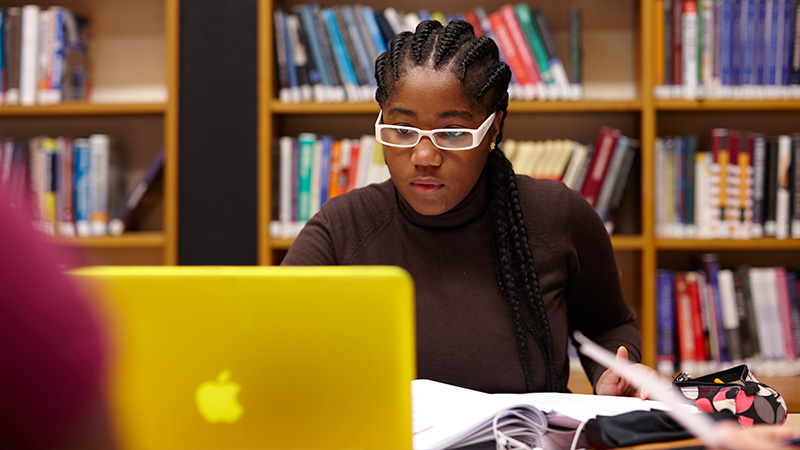Start dates: September 2026
Full time: PGCert: 4 months, PGDip: 8 months, MA: 12 months
Location: Headington
Overview
Whether you’re just beginning your writing journey or looking to take your craft to the next level, our Creative Writing MA is an inclusive programme that welcomes students from all backgrounds and experiences. In a city celebrated for its literary heritage and vibrant contemporary scene, you’ll join an inclusive, supportive creative community that inspires writers at every stage.
You’ll work closely with experienced academics and acclaimed authors from a diverse range of backgrounds to refine your voice, broaden your technical skills and explore a range of genres - from prose fiction and nonfiction, to poetry and scriptwriting for stage and screen. You’ll engage with current and past writers, including through Oxford Brookes Poetry Centre, and gain insights into the publishing world with industry-facing vocational modules.
If your goal is to pursue a new career in writing, media, or publishing and enhance your professional skills, this course will help you unlock your full creative potential and develop your writing to a professional, publishable standard.
Why Oxford Brookes University?
-
Expert academics
Our teaching staff are prize-winning writers who will pass on their experience through seminars and workshops.
-
A thriving, literary city
Oxford - city of Tolkien, Carroll, and R.F. Kuang. Study in the iconic Bodleian Library and join a vibrant community of writers, journalists, and creatives.
-
Collaborative working
Small groups offer an inclusive environment that builds trust with peers and tutors and strengthens your confidence as a writer.
-
Industry connections
Pitch your work to literary agents. Any graduating student who achieves a distinction is guaranteed to have their work read by a publisher.
-
Flexible awards
You’ll learn a lot about yourself and you may find that the full MA isn’t right for you. You can choose to finish with a PGDip or PGCert.
Course details
Study modules
The modules listed below are for the master's award.
All students take the core compulsory module The Writing Studio. In addition:
MA Students will also take the core compulsory module The Writing Project, and you can choose to take either;
- Two 40 credit creative writing modules
- One 40 credit creative writing module and two 20 credit publishing modules.
PGCert students can choose to take either;
- Two 40 credit creative writing modules
- One 40 credit creative writing module and two 20 credit publishing modules.
PGDip students will take one 40 credit creative writing module.
Please note: As our courses are reviewed regularly as part of our quality assurance framework, the modules you can choose from may vary from those shown here. The structure of the course may also mean some modules are not available to you.
Research
Our commitment to research-led teaching means that all our teaching staff are recognised experts in their field. They contribute to the canon of published work in their specialist fields influencing debate and discussion. And they value the opportunity to share their ideas with students through their teaching.
We also home to the Oxford Brookes Poetry Centre, which:
- creates a space for discussion and research
- promotes connections between poets, academics, and readers of poetry in the local community
- sponsors readings by poets, such as Simon Armitage, and a regular seminar series.
The Oxford International Centre for Publishing (OICP) is one of the leading centres for publishing education in the world. We focus on areas such as:
- book consumption and the life cycle of books
- book trade and publishing history (especially 18th-21st centuries)
- museum publishing
- serials publications
- pedagogy and publishing education
- the future of the industry.

Careers
At Oxford Brookes, we’ve had great success in helping talented writers find their voice – but we’re not a factory for producing writers. Our MA Creative Writing equips you with the critical thinking, creativity, and research skills that employers value across many industries. Graduates have gone on to roles with the UK Civil Service, Ralph Trustees Ltd, Hestia Charity, and the National Trust.
Many students use the course to develop their writing alongside existing careers, while others take their first steps toward publication or a future in the creative industries. You’ll benefit from close links with the Oxford International Centre for Publishing Studies, as well as opportunities to meet literary agents, editors, and publishers in a city with an international reputation for publishing.
Our graduates thrive in fields such as publishing, media and journalism, PR, marketing, education, research, and the charity sector - as well as becoming published authors in their own right.
Student profiles
Our Staff
Dr Morag Joss
Morag Joss is the award-winning author of the Sara Selkirk novels, Half Broken Things, Puccini’s Ghosts, The Night Following, Among the Missing (Across the Bridge) and Our Picnics in the Sun. She has also written for television, and writes short stories for print and broadcast. Her prizes and shortlistings include the CWA Silver Dagger, the USA Edgar Award for best novel, and a Heinrich Böll residency on the island of Achill, Ireland.
Read more about MoragRelated courses
Entry requirements
Specific entry requirements
For Applicants who have an undergraduate degree that includes Creative Writing (at 2:2 or above) there is no additional requirement. This will include those who have studied a BA in English Literature with Creative Writing, or a degree where Creative Writing was either a compulsory or optional choice in their undergraduate studies and they took at least one module of Creative Writing.
Applicants with an undergraduate degree in any other subject (at 2:2 or above) should submit a short piece of creative writing (of between 750 and 2,000 words). This could be a piece of prose fiction in any genre, poetry (no more than three poems of approximately 15 lines each), an example of journalism or opinion pieces, memoir, travel or nature writing, including blogs.
Applicants with professional experience in writing, with no first degree in any subject, should provide a CV detailing what they have achieved in their professional work in relation to writing, in addition to the work described above.
Please also see the University's general entry requirements.
Selection process
- Vocabulary, punctuation, grammar and idiom, to a level that allows you to express your intended meaning clearly. This demonstrates your understanding of language conventions, enabling you to explore different forms, for example in our Writing Studio module.
- An individual, emerging voice in terms of point of view, ideas, imagination, and style - this doesn’t mean 100% originality: all writing owes something to other writing! This shows your potential to explore how to use voice in different ways, for example through the Writing Voice module.
- Handling of narrative, and/or poetics, and/or TV, theatre, film script conventions. This demonstrates your potential to work on different techniques, for example, in the Bringing a Story to Life and Writing Poetry Now modules.
- The characteristics and style of your chosen genre or form, whether prose, poetry or script. This shows your potential to successfully develop your chosen form of writing as a focus for your final project.
English language requirements
Please see the University's standard English language requirements.
Pathways courses for international and EU students
We offer a range of courses to help you meet the entry requirements for your postgraduate course and also familiarise you with university life in the UK.
Take a Pre-Master's course to develop your subject knowledge, study skills and academic language level in preparation for your master's course.
If you need to improve your English language, we offer pre-sessional English language courses to help you meet the English language requirements of your chosen master’s course.
English requirements for visas
If you need a student visa to enter the UK you will need to meet the UK Visas and Immigration minimum language requirements as well as the University's requirements. Find out more about English language requirements.
Terms and conditions of enrolment
When you accept our offer, you agree to the Terms and Conditions of Enrolment. You should therefore read those conditions before accepting the offer.
International qualifications and equivalences
How to apply
Application process
Tuition fees
Questions about fees?
Contact Student Finance on:
Tuition fees
The following factors will be taken into account by the University when it is setting the annual fees: inflationary measures such as the retail price indices, projected increases in University costs, changes in the level of funding received from Government sources, admissions statistics and access considerations including the availability of student support.
How and when to pay
Tuition fee instalments for the semester are due by the Monday of week 1 of each semester. Students are not liable for full fees for that semester if they leave before week 4. If the leaving date is after week 4, full fees for the semester are payable.
- For information on payment methods please see our Make a Payment page.
- For information about refunds please visit our Refund policy page
Additional costs
Please be aware that some courses will involve some additional costs that are not covered by your fees. Specific additional costs for this course are detailed below.
Optional costs
| Additional costs | Amount (£) |
|---|---|
You may choose to purchase books to support your studies. Many books on our reading lists are available via the Library, or can be purchased secondhand. |
£10-30 |
It’s your responsibility to cover print / binding costs where coursework submission is required. Please note that a lot of the coursework is now submitted online. |
From £30 |
Accommodation fees in Brookes Letting (most do not include bills) |
£107-301 per week |
Accommodation fees in university halls (bills included, excluding laundry costs) |
£139-248 per week |
Graduation costs include tickets, gowning and photography. Gowns are not compulsory but typically students do hire robes, starting at £41. |
Typically £0-200 |
Students are responsible for their own travel to and from university for classes. For the 2025/26 academic year, the University is introducing an alternative subsidised travel offer for all students with further information on our Travel webpages. |
From £10 |
Funding your studies
Financial support and scholarships
Featured funding opportunities available for this course.
The Faculty of Humanities and Social Sciences believes strongly in the importance of making a difference to the world of our students, and in the ability and potential of our students to make a difference in the world. The Dean's Scholarship is one small way in which we make that belief tangible.
International students can apply for our International Students Scholarship. Please click on the link below to find out more.
All financial support and scholarships
Programme changes:
On rare occasions we may need to make changes to our course programmes after they have been
published on the website. For more information, please visit our
changes to programmes page.

